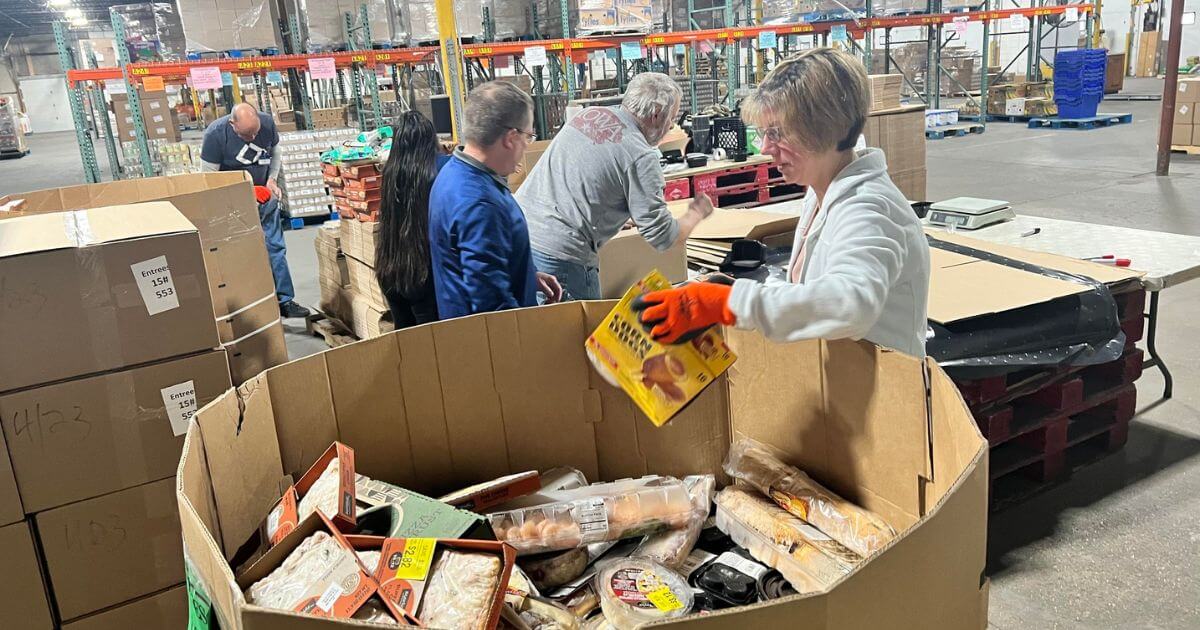
Photo courtesy of Food Bank of Siouxland
More than 6,000 households a month rely on the Sioux City-based Food Bank of Siouxland to help put food on the table, a number that will likely increase if Gov. Kim Reynolds signs a bill that would kick thousands of Iowans off public assistance benefits.
Pantries are supposed to fill in the gaps where paychecks and social service benefits don’t meet every once in a while, according to Jacob Wanderscheid, the executive director of the Food Bank of Siouxland. The nonprofit provides food throughout 11 counties in the Siouxland area in northwest Iowa and northeast Nebraska.
The Food Bank of Siouxland is the main food supplier for nonprofit agencies in Sioux City metro including food pantries and soup kitchens. It serves as a year-round source of food. The pantry serves about 6,335 households a month right now, he said. In the same period last year, the pantry saw 6,150.
The organization was created to help people in a pinch, but Wanderscheid said people are in a constant emergency, especially as they continue to recover from the pandemic and shoulder continued inflation.
Unfortunately, the emergency is probably going to get worse.
SF 494, a bill to take away food and health care benefits from qualified Iowans, awaits Reynolds’ signature.
Anti-hunger advocates have urged her to veto the bill because they say it will hurt Iowans who are already struggling to meet their basic needs.
“Iowa workers, families, children, older Iowans are going to go without the food and medications that they need,” said Natalie Veldhouse, a policy advocate for Common Good Iowa and a board member for the Iowa Hunger Coalition.
“That has implications for child development over time, student achievement, even lifetime earnings, preventable diseases, and any kind of economic insecurity also impacts mental health,” she continued. “Bills like these impact the stigma around food insecurity.”
[inline-ad id=”0″]
What it does
Earlier this month, Republicans in the Iowa Legislature passed a bill to require asset testing and identity verification for people who qualify for Medicaid and Supplemental Nutrition Assistance Program (SNAP) benefits.
E.J. Wallace, regional advisor for Save the Children Action Network in Iowa, said the potential law is only worsening the stress, shame, and embarrassment of people who are food insecure. Food insecurity is defined by the US Department of Agriculture as limited or uncertain access to adequate food.
“Right now, families across the across are saying that they are feeling uneasy about their economic futures,” Wallace said. “To have these safety nets and safeguards taken away when they’re already trying their best to achieve economic security is really short-sighted, and it’s going to push people further into dependency on public assistance programs.”
About 8,000 Iowans would lose their Medicaid benefits and 2,800 would lose their SNAP benefits under SF 494, according to estimates from the nonpartisan Iowa Legislative Services Agency (LSA).
Wanderscheid thinks those estimates are too low. He said the last time there was a significant change to SNAP, Siouxland food pantries saw close to a 25% jump in visits.
Now, staff at the food pantry are wondering if they’ll be able to provide the same amount of food they do now. Wanderscheid also worries people will reduce the amount of food they eat or that they’ll turn to less healthy options because produce and ground meat are still expensive.
As of 2018, 34 states have eliminated asset tests for public assistance benefits.
When Pennsylvania introduced asset tests in 2012, the change lasted only three years. The state repealed the asset tests in 2015 because about 4,000 households lost or were denied food assistance in the first year because of “too many” financial resources. More than 111,000 households were denied because they couldn’t provide the proper paperwork.
[inline-ad id=”1″]
Iowans already scraping by
Anti-hunger advocates held a rally on April 18 at the Iowa Capitol building in Des Moines 18 in hopes of swaying Reynolds to veto SF 494. At that event, Wallace shared the story of a single mother in Sioux City who frequently skips paying her power bill or rent because she needs the money for food and health care for her children and herself—despite having a full-time job.
“And we had all kinds of people that we talked to that didn’t want to share their stories, even if we told them that we wouldn’t share any personal identifying information because they’re ashamed,” he said.
Wallace and Veldhouse both said they’re concerned about another provision of the bill that gives people a 10-day period people to submit appeal paperwork if they are initially denied benefits or are disqualified from their existing benefits.
“With the asset test, we’re mostly worried that with the paperwork itself, people are going to be losing food because they didn’t tick the right box or they took 11 days to get something back,” Veldhouse said.
Because a lot of low-wage work has inconsistent scheduling and a person’s pay can vary from period to period, Veldhouse said advocates expect a lot of people will lose benefits because of those technicalities and then have to wait to reapply.
Wallace also criticized how asset testing prevents families from being able to save money because it’s unclear which savings accounts will be exempt from the limit.
“The decision now is: Do I stay on assistance and get the assistance that I need in order to make rent and utilities?” he said. “The expectation is that if you have savings, you have extra money, you need to be buying food with that. I don’t think that gets to the reality of what families are going through right now.”
[inline-ad id=”2″]
‘Fraud’ is nearly nonexistent
Wanderschied said he’s not at a panic stage yet because the need at the pantry decreases in the summer, as more work opportunities open up.
Instead, staff at the pantry are now focusing on donations to prepare for September, when the need will start to increase again until around March. He said SNAP has helped keep lines smaller, but the need is already high, and making it harder to access benefits is only going to make the lines longer.
Everyone who currently uses the pantry or SNAP needs those services, and no one can afford to lose them,” Waderschied said.
Iowa Republicans have defended the bill by saying it will reduce fraud, and they want to be responsible about using taxpayers’ money.
The LSA has calculated the rate of fraud for Iowa’s SNAP program is only 0.07% and SNAP is federally funded, with states paying half the administrative costs with the federal government.
According to the LSA, it would cost taxpayers about $7.5 million over two years to implement SF 494, which is about four times what it cost annually (roughly $2 million) to currently administer SNAP benefits. It would also require the Iowa Department of Health and Human Services to hire 219 full-time employees by 2026.
“Iowans are still going to be paying federal taxes; it’s just that we’re not going to be getting that money into the state,” said Veldhouse of Common Good Iowa and the Iowa Hunger Coalition. “It’s going to go to other states.”
Veldhouse also pointed out that SNAP recipients pay taxes too.
The majority of Iowa’s SNAP recipients are working or actively looking for work. About half of those households have children under the age of 18 in the home.
“How is making sure people have enough food not a good use of taxpayer dollars?” Veldhouse said. “It’s a lot of paternalism that doesn’t acknowledge why poverty exists or the reality of working families in Iowa. People are working really hard already.”
Nikoel Hytrek
4/27/23
[inline-ad id=”3″]
If you enjoy stories like these, make sure to sign up for Iowa Starting Line’s main newsletter and/or our working class-focused Worker’s Almanac newsletter.
Have a story idea or something I should know? Email me at [email protected]. You can also DM me on Twitter at @n_hytrek.
Iowa Starting Line is part of an independent news network and focuses on how state and national decisions impact Iowans’ daily lives. We rely on your financial support to keep our stories free for all to read. You can contribute to us here. Find ISL on TikTok, Instagram, Facebook and Twitter.
Politics

Biden announces new action to address gun sale loopholes
The Biden administration on Thursday announced new action to crack down on the sale of firearms without background checks and prevent the illegal...

Biden cancels student loan debt for 2,690 more Iowans
The Biden administration on Friday announced its cancellation of an additional $7.4 billion in student debt for 277,000 borrowers, including 2,690...
Local News

No more Kum & Go? New owner Maverik of Utah retiring famous brand
Will Kum & Go have come and gone by next year? One new report claims that's the plan by the store's new owners. The Iowa-based convenience store...

Here’s a recap of the biggest headlines Iowa celebs made In 2023
For these famous Iowans, 2023 was a year of controversy, career highlights, and full-circle moments. Here’s how 2023 went for the following Iowans:...






